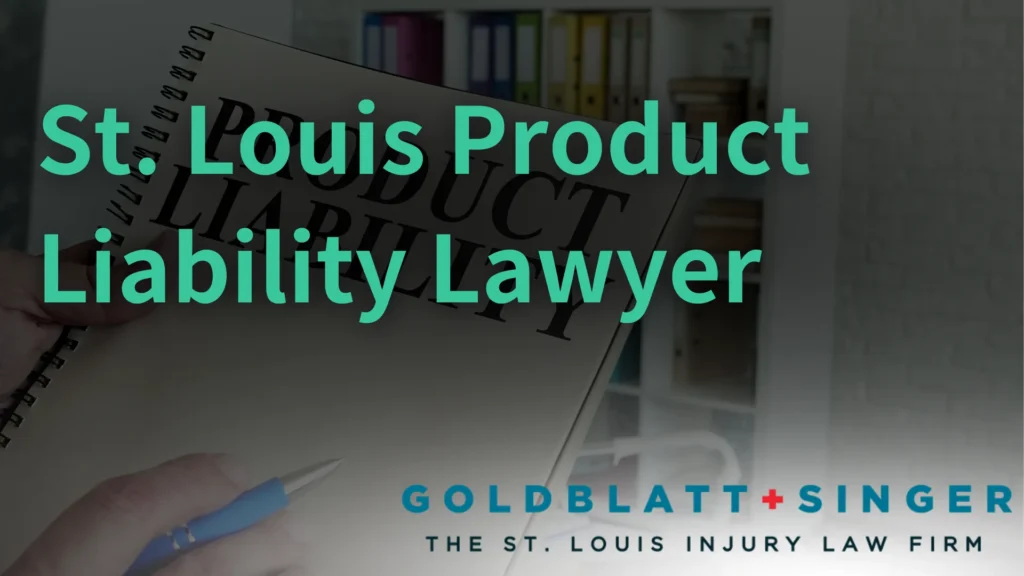
Product manufacturers have a legal obligation to ensure the products they sell perform as advertised and pose no threat of injury to end users in normal use. When product defects cause injuries, victims can often pursue product liability claims to secure compensation for their damages with the help of a St. Louis product liability lawyer. Product liability lawsuits are often complicated, and many large companies have in-house legal teams on permanent retainers.
Have you been injured due to a defective product in St. Louis, Missouri?
No matter what type of product liability case or personal injury case you’re facing, the team at Goldblatt + Singer is here to help. We’ve helped countless plaintiffs in the St. Louis area since 1949. Our legal team wants Missouri residents to know their legal options after suffering injuries from defective products. Call our team at (314) 231-4100 or contact us online for a free consultation.
Product liability refers to a manufacturer’s liability for placing a dangerously defective product in the hands of consumers. Product manufacturers employ various types of quality assurance protocols to ensure proper manufacturing and compliance with applicable regulations, but many factors can lead to product defects. Missouri follows a strict liability rule for defective products, meaning that manufacturers are strictly held liable only for the damages their products cause to consumers.
When product liability claims involve one-off incidents, an individual lawsuit can prove fruitful. However, some product manufacturers release a large number of defective products without knowledge of the defect potentially impacting many consumers. These situations may lead to class-action lawsuits against the manufacturer. A class-action suit involves many plaintiffs against the same defendant for the same issue. This option can be viable for plaintiffs who cannot afford the risk of pursuing St. Louis product liability claims alone.
A mass tort case arises when a single event or product inflicts harm upon a large group of individuals. Unlike class actions, mass torts treat each plaintiff’s case on an individual basis. In these cases, specific evidence is presented to show how each person was uniquely affected. This approach allows for a detailed assessment of damages, which can differ significantly based on the extent of each person’s injuries.
The first step in any St. Louis product liability claim is determining the nature of the defect. Generally, a product can be in a defective condition in one of three ways:
It’s important to note that some products, like lawnmowers, electric knives, and other types of cutlery, are inherently dangerous. Since these objects are obviously dangerous, the manufacturer must include a warning of the risk of intended use of the product. If a consumer causes an injury through an unintended use of the product, this does not constitute grounds for a defective product liability claim. Some products feature “latent” defects or defects that are not immediately recognizable and only arise under certain circumstances or after prolonged use.
Many manufacturers will issue recalls as soon as they identify a manufacturing defect, typically offering consumers replacements or repairs at little to no cost to prevent lawsuits.
Many products can cause serious injuries if defective. For example, John is cooking using an electric pressure cooker, but the device is defective and explodes. John suffers serious burns and a concussion, and the blast destroys part of his kitchen. As long as John followed the manufacturer’s instructions and used the product as intended, he can file a product liability claim against the manufacturer. Other household products that can cause serious damage if defective can include:
Countless products are capable of inflicting serious injuries and causing expensive property damage if defective.
Manufacturers of products for children and babies must exercise an even higher degree of care during these products’ development, manufacturing, and distribution stages. Children lack the caution and judgment of adults, so “childproofing” is essential for many of these products. Parents should be very careful when it comes to buying toys and other products for their children. Always check the recommended age range for any toy or children’s product before allowing it to come into contact with a child.
Some children’s products include batteries or electronic components that can cause fires, electrocutions, toxic exposure, or other injuries if defective. It’s essential for parents to carefully select products for their children based on consumer reviews and manufacturers’ reputations. Other risk factors include:
An injury to a child is a serious matter and parents can research whether any class-action lawsuits exist for a particular brand medical device or product.
Succeeding in a product liability claim is relatively straightforward. The plaintiff generally must prove the product in question is defective and that the defect caused the plaintiff’s damages. The plaintiff must also prove that he or she used the product as intended and followed the manufacturer’s instructions. Unlike personal injury lawsuits, the plaintiff does not need to prove the defendant was negligent in a product liability case. In some product liability cases, the burden of proof will effectively shift to the defendant. The defendant will then need to prove he or she met their obligations as a manufacturer and was not negligent.
If a product manufacturer fails to warn consumers of a known risk associated with the intended use of a product, the manufacturer is liable for any resulting damages. Plaintiffs in product liability lawsuits can claim several types of damages. It’s essential for potential plaintiffs to retain all documentation and evidence pertinent to their claims, regardless of whether they intend to seek compensation, join a class-action lawsuit, or file an individual lawsuit.

Generally, plaintiffs in a product liability lawsuit can claim economic and non-economic damages depending on the type of damages experienced by the defective product. Most product liability claims will lead to compensation for:
Any product liability claim carries the potential to escalate into a complex legal battle between an insurance company and multiple entities. No matter what type of situation may unfold, any plaintiff in a product liability claim will have a much better chance of securing compensation against an insurance company with experienced product liability lawyers.
The legal team at Goldblatt + Singer includes St. Louis personal injury attorneys with backgrounds in several areas of the law. This allows us to provide each of our clients with individually-tailored representation from an experienced product liability lawyer or any type of personal injury lawyer.
Client recovery is always our top priority, and our experienced St. Louis attorneys have the experience and resources to explore every available avenue of compensation on behalf of our clients. We won’t shy away from litigation against a large company for product liability cases. We can also help coordinate your claim with a class-action product liability lawsuit already in progress.
Call a Goldblatt + Singer St. Louis product liability lawyer at (314) 231-4100 or contact us online to schedule a free consultation. In the meantime, check out our client testimonials and the compensation results our St. Louis product liability lawyers have won. Our team works on a contingency fee basis, which means you don’t pay anything until our team wins your case.
Here are answers to frequently asked questions about product liability cases, product liability litigation, and more in St. Louis, Missouri.
Yes, there is a time limit, known as the statute of limitations, for filing a defective product claim. In Missouri, you typically have five years from the date of injury to file a claim. It’s crucial to consult St. Louis product liability attorneys to promptly to ensure your claim is filed on time.
While it’s possible to file a claim on your own, having an experienced defective product attorney can significantly improve your chances of receiving fair compensation. A St. Louis product liability attorney can help navigate the legal complexities, gather evidence, and negotiate with insurance companies.
If you were not using the product as intended, it might affect your claim. However, you might still have a valid claim if the misuse was foreseeable and the product lacked adequate warnings or instructions. Consult with a St. Louis product liability attorney to assess your specific situation.
Defective prescription drugs or medical devices can also be the basis for a product liability claim. These cases often involve complex issues related to FDA regulations and medical standards. An experienced attorney can help navigate these complexities and pursue compensation for your injuries.
“I was hurt in a car accident, and my attorney Christopher S. Saracino, Jr. and Courtney Mayer worked tirelessly to make sure I got all the help I needed to help with my recovery…
Goldblatt + Singer Law Firm TRULY CARES about their clients! They keep you informed about what is going on every step of the way. If you have any questions, they call you back right away (Even after regular working hours). GOLDBLATT + SINGER IS THE BEST LAW FIRM TO CHOOSE if you’re involved in an accident. I HIGHLY RECOMMEND this law firm!”
“I had a horrible accident and I knew my hospital bills were going to be ridiculously high and I had no idea what to do…
A friend referred me to this company and from the beginning they made me feel like I had someone on my side. They didn’t only call about my case, but to check on me and see how I was feeling. The experience I had with them was amazing and I would refer everyone to let them assist you with your problem!”
“Passing through the St. Louis area, I suffered a bad injury at a local business…
I called Amanda at Goldblatt + Singer to talk through what happened. Amanda and her team took my case and made sure I was taken care of from beginning to end.”
“Thank you for all you’ve done in helping me recover! I wanted you to know how much you are appreciated…you’ve been such a great help to me in many areas. God bless you for your services as a great attorney.”